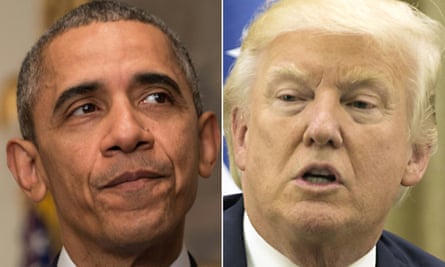A Brief Colonial History Of Ceylon(SriLanka)
Sri Lanka: One Island Two Nations
A Brief Colonial History Of Ceylon(SriLanka)
Sri Lanka: One Island Two Nations
(Full Story)
Search This Blog
Back to 500BC.
==========================
Thiranjala Weerasinghe sj.- One Island Two Nations
?????????????????????????????????????????????????Sunday, August 2, 2020
Obama and Trump highlight two Americas as election draws nearer
Analysis: as the former president eulogized a civil rights hero, his beleaguered successor seemed intent on undermining faith in democracy- Join us for a live digital event with the former US attorney general Eric Holder to discuss voter suppression in the 2020 election, Thursday at 5pm ET. Register now

The events of the week highlighted the gulf between the former and current presidents. Photograph: Nicholas Kamm/AFP via Getty Images
David Smith in Washington-@smithinamerica-1 Aug 2020
They were six hours that defined two Americas as well as exposing the magnitude of the decision facing voters in November.
At 8.30am on Thursday, the US government announced that gross domestic product had suffered the biggest decline on record because of a coronavirus-induced shutdown. Minutes later, Donald Trump warned on Twitter that “2020 will be the most INACCURATE & FRAUDULENT Election in history” – and suggested that it should be postponed.
As the morning wore on, it was announced that Herman Cain, a former presidential candidate who attended a recent Trump rally without a face mask, had died from Covid-19. And in Atlanta, Georgia, at the funeral of the civil rights giant and congressman John Lewis, George W Bush and Bill Clinton paid tribute and the frail Jimmy Carter sent a message of condolence.
Then came a soaring eulogy from Barack Obama, drawing pungent comparisons between notorious racists of the 1960s and the America of today. “Bull Connor may be gone,” he said. “But today we witness with our own eyes police officers kneeling on the necks of Black Americans.
Soon after the predominantly African American congregation stood and applauded Obama at a pulpit once graced by Martin Luther King Jr, Trump headed to the Red Cross in Washington where Jerome Adams, the surgeon general, told him: “I was in Trump country and they told me to deliver you a message, Mr President. They told me to tell you, you look badass in a face mask.”
The collision of these two worlds, so radically opposed in style and substance, played out live on cable news. In Washington, Trump, under siege from a coronavirus death toll exceeding 150,000, with an economy in free fall and poll numbers to match, was discrediting the legitimacy of the election and drawing a bipartisan backlash that left him isolated as never before.
In Atlanta, four presidents from less polarized times were joining to pay homage to a man who, from his early 20s, had put his life on the line for voting rights and faith in democracy. For Democrats, the sight and sound of Obama at the top of his game provoked a rush of nostalgia – and resolve to turn back the clock by electing his vice-president, Joe Biden, as the next president.
Moe Vela, a former senior adviser to Biden at the White House, said: ““ To me, the whole day was almost a dichotomy. It heightened the choice that we as Americans get in this election. This completely failed leader is playing political games with a legally baseless suggestion about delaying the election. It’s worked for him his whole life but it’s not working any more. I am confident he is in a panic because his old playbook isn’t working.”
Trump spent much of 2016 claiming the election was “rigged” until he narrowly won it. He has made numerous statements casting doubt on the 2020 version, insisting that an expansion of mail-in voting due to the pandemic will lead to widespread fraud – a claim debunked by studies. Even so, his questioning of whether 3 November should remain as the election date still drew sharp intakes of breath and cries of fascism.
On one level, it was classic Trump and remarkably effective: the media furore did dull the impact of the shocking economic numbers that showed a 32.9% contraction in annualized GDP last quarter. But as the Senate majority leader, Mitch McConnell, and others shot down the idea, noting that elections continued through the civil war and second world war, and that the president has no power to change the date, it seemed Republicans had finally drawn a line not even Trump could cross.
On Thursday afternoon, at a White House press briefing, the president sought to clarify: “Do I want to see a date change? No. But I don’t want to see a crooked election. This election will be the most rigged election in history.”
That, many commentators said, was the true intention: to make Americans distrust their own democracy. The coronavirus pandemic and expected surge in mail-in voting does raise the spectre of a chaotic election riddled with delays, disputes and myriad legal challenges – all fertile territory for Trump’s conspiracy theories. He may choose to declare victory long before the last vote is counted and rely on conservative media to weaponise the message.
Tara Setmayer, a former Republican communications director on Capitol Hill, said: “All indicators point to Donald Trump losing but this is not 2016 and Biden is not Hillary Clinton. But who knows? Look at what Trump is doing.
“That tweet about delaying the election, even though constitutionally and under the law he cannot do that, is planting the seeds to get people to question the integrity of the election, which is more dangerous because the peaceful transfer of power is partially what has allowed this constitutional republic to thrive for the last 240 years. When you start chipping away at that, it’s very banana republic to dictatorish and that worries me about what happens in November. There’s no telling what this freakin’ lunatic is willing to do to sully the election.”

